“Sharing knowledge is a wonderful and necessary thing and I admire every educator in this room today,” stated Confederacy of Treaty 6 First Nations Grand Chief Bernice Martial. She was one of the last speakers at the Treaty 6 Fourth Annual Educator’s Conference, held at the Kingsway Avenue Ramada Inn and Conference Centre in Edmonton on January 29-30.
“Today,” she added, “we have to plan for our future generations, for the unborn children yet to come. I want them to have what we have here today.”
The Grand Chief spoke about the outstanding turnout of teachers and administrators, the knowledge they bring today and the hope they inspire for tomorrow. Languages, love and respect, she said, are key to positive development.
“We need to continue to teach our children the languages they were born with; they need to know who they are,” she continued. “Once you find your identity, you feel good about it; you accept it. Your children are your strength; how you teach your children, how you talk to them, how you raise them – that’s how they are going to be and that’s the way they will treat you. Teach love and respect because every child needs to be loved and every person needs to be respected. Tell your children how precious they are and how much you love them; it doesn’t matter how old they are. Be grateful for what you have, even if it is little, because sometimes even little means a lot.”
Though scheduled to speak on the first day of the conference with a welcoming address, Grand Chief Martial’s words didn’t come until the final afternoon. On January 29 she attended a special ceremony and was a signatory on a new Memorandum of Understanding between the managers/administrators of Fort Edmonton Park, Fort Management Company and the Confederacy of Treaty 6 First Nations.
This year’s conference saw 625 delegates participating in six 75 minute-long break-out sessions that covered over 70 topics and were delivered by more than 25 presenters.
“It was an amazing conference; the participation level was high and the breakout sessions were busier than ever,” beamed Treaty 6 Special Education Manager Madelaine Calliou. “The intent of our Fourth Annual Learning for Life Conference was to provide an opportunity for Treaty 6 educators to share, learn and implement innovative, creative, strength based educational practices for student success. We met that goal. It will take some time for the feedback to filter back but I am certain that it will all be quite positive.”
Well known and respected Elder and businessman, Charles Wood opened the event with a prayer and welcoming comments before introducing the Host Drum, Wakamae, an outstanding local group whose honour songs and powwow beats resonated throughout the room while the audience tapped its feet and nodded in unison with the rhythm.
Alexis Nakota Sioux First Nation Chief Tony Alexis was among the first speakers to address the large gathering. “Within the family unit there has always been a principle of honour and respect and helping one another and all with the Creator in the centre, at the forefront. The children you are working with right now are the most precious in our nation; they are like sponges, they want to learn, they want to help. They come to school with a lot of enthusiasm and a lot of hope – and you get to teach them and share the majority of their time every day they are at school. I hope as educators you think of them in this way; they are so precious that we need to provide the best guidance possible for them so they remember who they are and the people who suffered and struggled to bring us where we are at today. Let them know what our history is all about; let them celebrate that history and at the same time let them know what tools are available to them in their academic years.
“The conference is about celebrating lifelong learning. We speak of the treaties but long before treaties we had hunting, fishing, gathering. We had our own way of life, we had our own government, we had our own laws and we lived that way. We need to educate our children so that they become doctors, lawyers, engineers, accountants or someone in business.”
Chief Alexis encouraged parents to spend time with their children, to work with them, to take them to school and walk them to the door.
“When parents take the time to talk to their children, to nurture their children, to be involved in everything they are doing, children excel. I share that with our school in Alexis; it’s a vision that we have to start implementing in our programs, that our parenting roles are important. We all love our children so let us find the behaviours and do what we need to do to ensure our children succeed.”
In his comments, Alexander First Nation Chief Kirk Burnstick, said that teachers play an integral role in the development of the children they see and work with on a daily basis. He also commented on the importance of getting parents more involved in their children’s daily routines.
“We have to find ways to get parents involved, find or develop different mechanisms so they can see the difference they can make in their children’s lives. Education is very important and I say that as someone who has a vested interest because of my daughter and my grandchildren and all the children at Alexander who would benefit from that. Sitting here, I am happy to see that so many educators are taking a vested interest in our children. I certainly appreciate the efforts you are making on their behalf across the treaty area.
“I see we have our friends, members of government here today, federal and provincial. They have to learn from us; they need to know what we think. We have always followed a system of theirs but we will have to start following our own. We started a few initiatives at Alexander that hopefully will help our kids with their culture and their language; I believe it is doing wonders for them. My daughter speaks Cree and I can’t – that’s a generation that’s been skipped in our nation (residential school repercussions) and I hope we can now get it back. In closing I just want to say keep working hard, work together because it is you, the educators, who will help shape the education programs for our kids.”
Wab Kinew, host of CBC’s Canada Reads series, took to the podium and delivered a 45 minute presentation that captured the essence of education, achievement and sacrifice. He talked about the importance of honouring one another, about putting the education of the nation’s children first, about residential schools and their lingering effect, about pride and passion and celebrating the achievers so that they can become the role models they deserve to be. Keynote Speaker/Presenter Art Napoleon took to the podium on the second day of the conference.
The first three of the six break-out sessions took place in the afternoon of January 29. The various rooms and salons utilized for each presentation filled to capacity as the hundreds of delegates made their way from one session to the next.
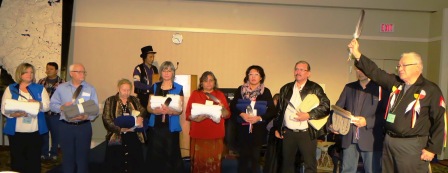
Elder Charles Wood salutes his fellow Eagle Feather recipients during Treaty 6 Educator’s Conference.
An early morning Pipe Ceremony by Treaty 6 Elders, a continental breakfast and a series of break-out sessions filled the agenda on January 30. AFN Regional Vice Chief Cameron Alexis was the first of three speakers to address the gathering during the final afternoon of the conference. He was followed by Treaty 6 Grand Chief Bernice Martial and Keynote Presenter Art Napoleon. Napoleon is a strong and knowledgeable advocate who cites Indigenous approaches to education, leadership, curriculum development, governance, and cultural revitalization. Napoleon holds an MA degree from the University of Victoria in the area of Indigenous language revitalization.
Regional Vice-Chief Cameron Alexis began by thanking the gathering for their attendance and Treaty 6 for his invitation to speak during the conference and continued with comments on several topics.
“To the educators here today who came to communicate, share your ideas, perspectives and practices, I say thank you for working together to find even better ways to share your knowledge,” he said. “I thank you for your dedication and for teaching our children, the future leaders of our communities and hopefully, one day, our country.”
Chief Alexis mentioned the Memorandums of Understanding on Alberta’s Education Act, adding that there is a strong indication “that they will lead to a stronger education of the young people here in this province.” Noting that some things may have to be adjusted he said the MOU is “a crucial and very important document that we can work from. It’s a difficult situation but it is important to understand that in this day and age the Chiefs, the leaders of our communities, want full consultation on all matters. It doesn’t just relate to gas and oil and minerals; it’s about all matters that affect our people in this country.”
He also spoke about the federal government’s proposed Bill C33: First Nations Control of First Nations Education Act.
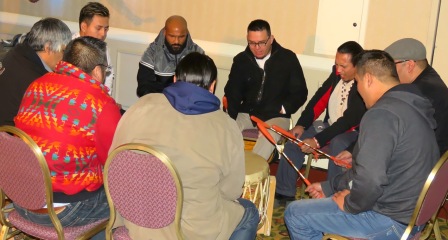
Wakamae Drum Group: Thomas Potts (back showing) then l-r Jonah Letendre, Charles Alexis, Joby Yellowdirt, Ryan Ford, Josh Alexis, Sidney Potts, Dwayne Alexis, and Lenny Potts.
“There was a lot of discussion across the country; a lot of meetings took place and a lot of resolutions were brought forward about whether or not we should accept Bill C33,” he stated, adding that the proposed Bill is primarily about funding. Because there are other systems in play with different agreements the Chiefs decided to vote against Bill C33 as it stands. Yes there was funding dedicated to the Bill but the big picture was we were not consulted on the whole matter. In the coming days we will know where the Bill is at. The Chief’s continue to work on the funding” aspects of the controversial Bill.
“I’m very happy with what I see here today,” assured Grand Chief Martial. “This conference gives the educators an opportunity to collectively collaborate and share their experiences and their knowledge; this helps make them even better educators. I am a strong believer in education and I encourage every child to put in the effort it takes to succeed, every teacher to continue doing what you are doing, providing our youth with the answers they’ll need to succeed as adults. I am pleased that this conference is so successful and that so many educators came out to share themselves and their knowledge with their peers. This type of event allows our teachers the time to collectively collaborate as they share their knowledge and experience.”
by John Copley

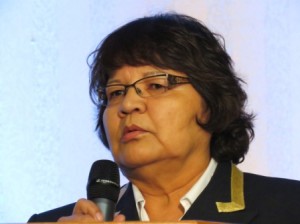
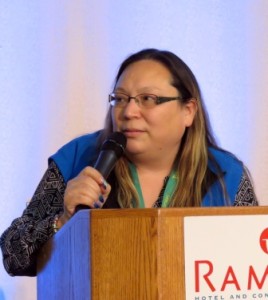
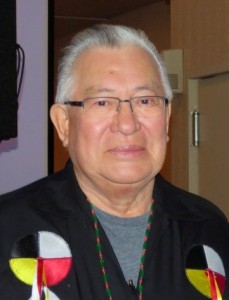
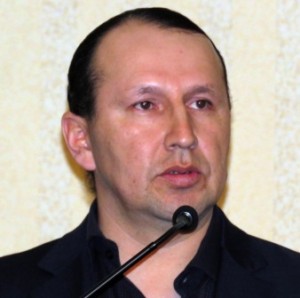
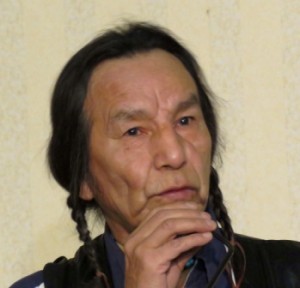
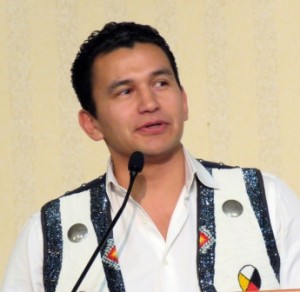
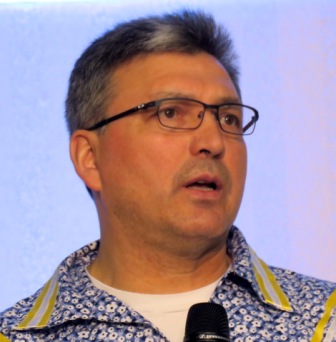

Be the first to comment on "Treaty Six Educator’s Conference draws a full house"